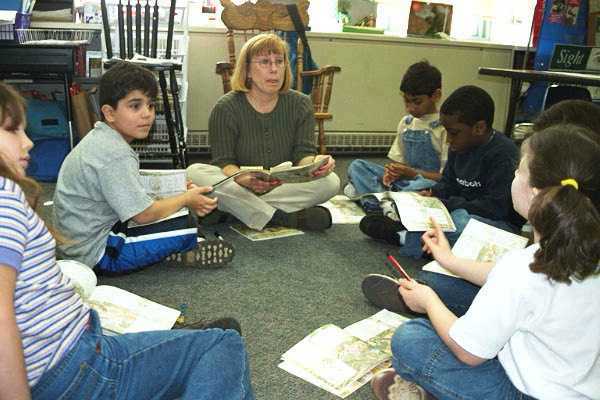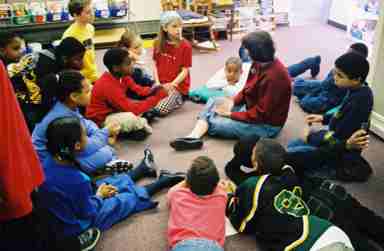
Whole Schooling Press Publications of the Whole Schooling Consortium
Whole
Schooling
Press is the outreach arm of the Whole Schooling Consortium. Our
goal is to develop materials that enhance the building of inclusive
community, improve educational opportunities for all people, and
contribute to social justice. Most resources on this site are in Portable Document
Format (PDF). You will need
a copy of Adobe Acrobat Reader to access these documents which
you can download HERE.

Good Teaching 4 All: Building an Inclusive Community of Learners. Dr. Michael Peterson is in the process of writing this book on Whole Schooling. Here we provide the Table of Contents and the 3 chapters he has completed: (1) In Chapter 1, Getting Started, Dr. Peterson provides an introduction to Whole Schooling and the book; (2) Chapter 2, Classroom Design and Technology provides guidelines for how teachers may design their classrooms to foster active learning and building of community; and (3) Chapter 3 provides strategies for building a democratic, inclusive community of learners in the classroom.
Making Way: The Journey Towards a Quality Life after High School. Dr. Peterson is writing this book to provide a practical guide for teachers and human services personnel to design and implement inclusive transition programs that help students with special needs become full participants in their communities and live a quality life. He has written these six chapters. Table of Contents. Chapter 1 discusses the importance of a personal philosophy of transition and provides a framework for developing such a philosophy. This serves as an introduction to the book. Chapter two discusses strategies for identifying interests, skills, needs, and resources of students related to transition to adult life. Chapter 3 describes strategies for empowering students, helping them learn to advocate for themselves and make decisions about their lives. Chapter 4 gives guidelines for connecting students to neighborhood and commmunity resources. Chapter 5 discusses ways to build and strengthen student's circles of support and relationships with people in the community. Chapter 7 describes person-centered planning and the process of creating transition plans. Chapter 8 discusses human service agencies for adults with disabilities that provide resources for transition. Your feedback regarding these materials would be appreciated. Contact Michael Peterson.
Whole Schooling Renewal
WHOLE SCHOOLING MEDIA CENTER. We have organized video clips that llustrate the Six Principles of Whole Schooling.
LEARNING WELL TOGETHER: Lessons about connecting inclusive education to whole school improvement. 2002. Final report of the Whole Schooling Research Project, a qualitative study of 16 schools in Michigan and Wisconsin that focused on the interaction of inclusive education and exemplary schooling and teaching practices.
WISCONSIN TEAM: Whole Schooling Research Report. Report from Wisconsin of their analysis of study of inclusive education and exemplary schooling practices in 8 schools.
WHOLE SCHOOLING: Education for a Democratic Society. Michael Peterson, Kim Beloin, and Rich Gibson. 1997. This short paper provides an introduction to Whole Schooling as a framework for building schools of excellence and equity for a truly democratic society.
CREATING SCHOOLS THAT WORK: Promoting excellence and equity for a democratic society through Whole Schooling. 2003. Michael Peterson and Lynne Tamor. This paper discusses key problems in schools that lay the foundation for the need for Whole Schooling approaches. This is followed by a brief discussion of the Principles of Whole Schooling and a description of how they may look in practice.
KEY ELEMENTS IN BUILDING WHOLE SCHOOLS Short paper that illustrates in summary form how Whole Schooling looks in practice in a school. Michael Peterson, 2001.
WHOLE SCHOOLING RENEWAL GUIDE. 25 page document describes process for using the Six Principles of Whole Schooling as framework for guiding school improvement and reform. Michael Peterson, 2001.
WHOLE SCHOOLING: An Action Guide for Planning provides detailed descriptions, for each principle, regarding what we would hope FOR, and hope NOT to see in schools working to implement Whole Schooling principles and practices. Michael Peterson, 2001.
DOING AND THINKING WITH A PURPOSE from a Community-centric Foundation: Lessons Useful for School Reform. 2002. Thomas Neuville. Millersville University. Article that describes useful processes for engaging groups of people in developing common visions, action plans, and working through different perspectives to a common goal.
UNIVERSAL EDUCATION: All Children Belong. A position and concept paper describing a concept of education where instruction is designed for students with diverse characteristics from the beginning, allowing all children to belong full-time. Product of the Everyone Together Project, 2003.
WHOLE SCHOOLING AND THE CIRCLE OF COURAGE. 85 page monograph that describes how Whole Schooling connects to and reinforces that approach used by the Circle of Courage. Patricia Taylor and Michael Peterson, 2009. PDF file.
ROUGE FORUM ARTICLES& NEWSLETTER. This newsletter is developed a published to promote democratic practices in learning and the community.
THE SPECTACLE OF STANDARDS AND SUMMITS: THE NATIONAL EDUCATION SUMMIT. E Wayne Ross.
A CHILDREN'S MIRACLE NEEDED to Solve the School Crisis. Grace Lee Boggs. Presentation at the International Education Summit in June, 2000. Long time activist Grace Boggs describes a new vision of schooling that links learning to meaningful community building work.
INCLUSIVE TEACHING: Creating Effective Schools for All Learners. A new text from Allyn and Bacon based on Whole Schooling. Resources: ordering information; book website.
KEY ELEMENTS in Building an Inclusive School. Michael Peterson. 2000. Short paper that describes some essential parts of an inclusive school.
INCLUSION: A Catalyst for Whole School Reform. William Henderson. 2001. Principal O'Hearn Elementary School describes how the commitment to inclusive schooling has facilitated overall school improvement and reform in this school over the last ten years.
WE ALL BELONG: One School's Journey to Inclusion. Barbara Mick, December 2001. Text of a keynote speech given at the conference of the Western Inclusion Network of Michigan in which she describes how Ausable Primary School in Grayling, Michigan, became a fully inclusive school and how this has benefitted all students.
EDUCATION AS A MEAN to Achieve Valued Outcomes. 2003. Carolyn Das. In this short article, an activist parent of a child with a severe and multiple disability, shares the value of inclusive education and strategies for connecting her son's learning to the general education curriculum in a systematic but manageable way.
OPENING NEW DOORS: Transition from High School to College For a Student with a Moderate Disability. April, 2003.Janice Fialka Increasing numbers of students with significant cognitive disabilities are attending college and participating in typical courses -- auditing, taking courses with additional support and adaptations. This article describes the story of one student and his family and what they are learnign about this process.
SECONDARY
SCHOOL INCLUSION For Students With Moderate To Severe Disabilities. 2002. Tim
Loreman,
PhD
Article that
describes research
regarding inclusion of students
with moderate to severe disabilities in high schools in Victoria, Australia.
The study provides solutions to identified problems pointing particularly towards
changing the role of school ‘integration teachers’ to facilitate
better training for teachers in effectively including students with disabilities
and addressing their needs.
INCLUSIVE EDUCATION - PROGRESSIVE EDUCATION: IS THERE A RELATIONSHIP? Lynne Tamor and Michael Peterson, June, 2001. 12 page paper that questions the degree to which self-styled progressive educators are willing to embrace inclusive education for students who are diverse based on race, culture, wealth, and ability.
FOR BETTER OR WORSE: Building Inclusive Schools In Poor Urban And Rural Communities Michael Peterson, Kim Beloin, and others 1998. Describes the need and strategies for work in low income urban and rural communities to foster inclusive education growing out of experiences in Detroit and rural Wisconsin.
INCLUSIVE EDUCATION IN MICHIGAN: An Analysis of Change in Practice and Policy -- 1988 - 1998. Michael Peterson. This article tells the story of movements towards inclusive education in this decade and draws conclusions about the present status and learning out of this effort.
FROM APARTHEID TO INCLUSIVE EDUCATION. Sigamoney Naicker. Director of Inclusive Eduation for the country of South Africa. Presentation at the International Education Summit, Detroit, Michigan, June, 2000. Describes movements in South Africa from apartheid, embrace of inclusive education, and the connection of issues of race, class, and ability for true transformation of schooling.
SPECIAL NEEDS EDUCATION: Building an Inclusive Education Education and Training System. Education White Paper # 6. Department of Education, South Africa. May 2001. This paper describes policy framework and practice in the country of South Africa where inclusive education is being seen as one important component in transforming that country's education system in post-apartheid South Africa.
 AUTHENTIC, MULTI-LEVEL TEACHING. Michael
Peterson, Lynne Tamor,
and Mishael Hittie, 2002. This 46 page document discusses how
schools typically deal with the highly diverse abilities of students
in classes and describes principles and practices for authentic
multi-level teaching, instruction that supports students with
dramatically differing academic abilities in learning well together.
This document is based in part on research conducted in the Whole
Schooling Research Project from 1998 - 2002 (See link to full
report below).
AUTHENTIC, MULTI-LEVEL TEACHING. Michael
Peterson, Lynne Tamor,
and Mishael Hittie, 2002. This 46 page document discusses how
schools typically deal with the highly diverse abilities of students
in classes and describes principles and practices for authentic
multi-level teaching, instruction that supports students with
dramatically differing academic abilities in learning well together.
This document is based in part on research conducted in the Whole
Schooling Research Project from 1998 - 2002 (See link to full
report below).
MULTI-LEVEL LESSON PLAN GUIDE: Earth, Moon, and Beyond Jeni Gonzales Lesson plans developed based on guidelines in above document for class at Wayne State University
INCLUSIVE TEACHER GUIDES. Documents developed by teacher education students at Wayne State University as part of a course on inclusive education. Seven guides ranging from elementary through high school algebra.
LANGUAGE ARTS AND THE INNER CURRICULUM. 2003 Andrew Johnson, University of Minnesota-Mankato.This article discusses the inner curriculum, a school's plan for addressing the inner life of students that includes their emotions, imagination, intuition, ideals, values, and sense of spirituality.
INCLUSIVE LITERACY LEARNING: Towards a Whole Language Partnership. 1999. Michael Peterson, Karen Feathers, and Kim Beloin. Article suggests that inclusive education and whole language have overlapping philosophies and concerns and recommend an international partnership among these two movements.
BUILDING COMMUNITY in the Classroom Mishael Hittie. 2000. MacArthur Elementary School, Southfield, Michigan, USA. Presentation at the International Education Summit. Paper describes key strategies for building as a sense of community in an elementary classroom.
COMMUNITY CIRCLES: A Guide for Supporting Youth. Michael Peterson and Sharon Murphy. A monograph that describes strategies for linking youth to communities, building circles of support, and engaging in person-centered planning.
SOLVING SOCIAL PROBLEMS THROUGH COMMUNITY
BUILDING
30 page paper that discusses
the ways in which community building may be a central framework
and set of strategies for solving serious social problems. The
paper further explores strategies by which our society may more
clearly understand and strengthen community building process.
COMMUNITY BUILDING IN AMERICA: AN INTRODUCTION
Michael Peterson. Paper that provides an overview of various approaches
to community building in the United States.
BUILDING CARING COMMUNITIES: CONTRIBUTIONS OF PEOPLE WITH DISABILITIES AND THEIR ALLIES. Michael Peterson. 20 page paper that describes how efforts to include and support people with disabilities in school and community life are contributing to the social fabric for all people. The paper describes circles of support, person-centered planning, inclusive education among other approaches.
COMMUNITY BUILDING INITIATIVES AND RESOURCES ORGANIZATIONS. Michael Peterson. Overview of community building initiatives being taken by national and local organizations.
DETROIT INITIATIVE FOR INCLUSIVE COMMUNITIES Michael Peterson. 15 page paper developed as an outgrowth of a series of meetings of Detroit residents and interdisciplinary faculty at Wayne State University in Detroit. The paper describes an operational framework for strategies that may be used to building social capital and neighborhoods with a sense of community and inclusion of diverse people, including those with disabilities.
ROLE OF THE SPEECH LANGUAGE PATHOLOGIST IN WHOLE SCHOOLING. Lynne Hebert Remson This short article describes an optimal role for speech language pathologists in schools based on the principles of Whole Schooling.